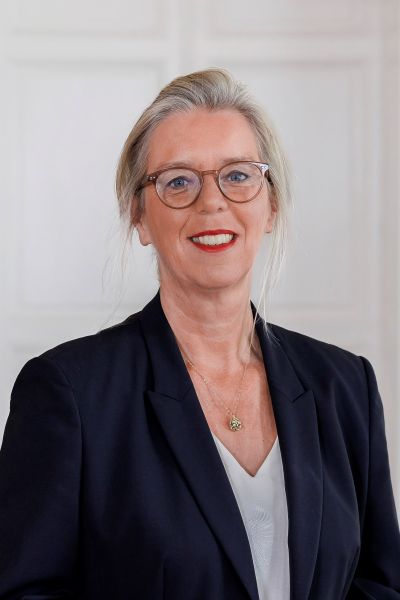Ankie Hoefnagels has led the Global Minds research group for four years, based at the Hotel Management School Maastricht (Zuyd University of Applied Sciences). Together with eight colleagues, she researches the development of competencies needed to function optimally in an international environment. It seems odd now, Hoefnagels admits, but twenty years ago this field of research was still in its infancy. And now that it’s here, it feels so obvious. Of course, you need to know what does and doesn’t work when it comes to 'mingling' in both the workplace and society. Hoefnagels explains: ‘The world has become smaller; we encounter people from different cultures, generations, socio-economic backgrounds, with disabilities, and from across the spectrum daily. Together, we face enormous challenges, whether it's climate change, sustainability, or labour migration. Instead of working together, you increasingly see polarisation emerging. If people don’t understand or recognise one another, we’ll never find solutions.’
International Internship
Hoefnagels' journey to Global Minds may seem like a series of chance events. Yet she was already intrigued by 'people who are different' from a young age. ‘I remember being about eight years old, on a holiday park in Noord Holland with my parents. There were also refugees from Iran. My brother and I played wonderfully with a brother and sister who had fled from Persia due to the Shah’s reign. We couldn’t talk to each other; they were different, wearing clothes unfamiliar to us. Still, we got along quickly: we had fun, drank cola, and played ball games. That’s when my interest in people who are different was born.’ Although her natural curiosity led her to consider studying journalism or attending a hotel school, she chose to study English and Literature. ‘It was a bit of a cowardly choice, really, I was good at English, and it seemed easy.’ After teaching secondary school, she switched to the Hotel School Maastricht in 1991. ‘I knew nothing about hospitality and asked my manager if I could do a five-week internship during the summer holiday. That’s how I ended up in a five-star hotel in London and later another in New York. I did everything: from housekeeping to reception, and I thought it fascinating. Whether it was guests or colleagues, they came from all countries, cultures, and social classes. I saw how well hospitality professionals could ‘mingle’; it’s part of true hospitality: being able to empathise with others and understand what they need or what drives them. You learn this both in your studies and on the job. An international internship is already a ‘life-changing experience’ in itself, and it's very useful for developing intercultural competencies. When I arrived in London at 27, alone, I thought: what have I gotten myself into? Until there was a knock on my door. Colleagues were standing there, inviting me for a picnic in Hyde Park. And there I was with my Italian chef, two French women, and a Brazilian guy – it was wonderful! That experience was unforgettable.’
‘The more interculturally competent you are, the better you’ll understand others, the more enjoyable your work will be.’
Mini-society
Over the years, this fascination became a core part of her work. ‘Why is it that in a hotel, people from all cultures, ages, and social backgrounds can work together, while in society, it’s so difficult?’ That question led to a job as a lecturer-researcher at the International Relationship Management research group in 2008, where she explored the development of intercultural competencies. ‘In the early days, it was really pioneering work. Research into the development of young people’s ability to deal effectively and appropriately with diversity – whether that’s culture, gender, or age – was still limited. And yet, this is exactly what’s needed. You’d have to have lived under a rock not to know the challenges we face globally.’ The hospitality sector turned out to be the perfect metaphor: ‘It’s a mini-society and the ideal, safe environment to practise intercultural competencies, or ‘mingling’ with other people. Why does it generally work so well in a hotel, but in society, it’s a headache? I think that an interesting question.’ Hoefnagels and her colleagues study the ‘Big Five’ personal traits that contribute to success – the multicultural personality. Besides empathy or being able to see beyond the ‘empathy wall’, it’s important to be open-minded and avoid quick judgments of others. ‘Those who can handle unexpected situations and reactions flexibly will be better at ‘mingling’. Emotional stability, the ability to cope with stress, is another success factor, and lastly, the ability to take social initiative.’
Global Mind Monitor
Hoefnagels and her team developed the Global Mind Monitor from all this data. It consists of a set of questions, all focused on how students and others function in a different culture. Are you flexible in new circumstances? Do you understand another culture? ‘Can you thrive in a multicultural and diverse environment? It’s useful for students going on international hotel internships, but it's now applicable in a much wider context. For example, one of our researchers is working on a project in Dutch municipalities, where hospitality and managing different types of people are crucial – just like in healthcare. In fact, everywhere we encounter others: people from different generations, cultures or social backgrounds, gender, or those with disabilities.’ Everything then revolves around four steps to success. ‘It starts with understanding each other, truly seeing the other person. But also appreciating that the other person is not the same, does not think, or act the same way you do. If you can truly connect with one another and act based on that communication, then intercultural interaction starts to work. We will need the art of ‘mingling’ more and more in the coming years. I see a leading role for the hospitality sector in this. A well-trained Hotel School graduate has an ingrained sense of hospitality, capable of reading others. That’s the foundation you need to make the world a better place.’
A global mind is a joy forever.
Bio Ankie Hoefnagels
Dr Ankie Hoefnagels is a professor at Zuyd University of Applied Sciences. Her research and teaching focus on developing young people’s ability to effectively and appropriately handle diversity, whether in terms of culture, gender, or age. She studied English and Literature at Utrecht University. Since 1991, she has been a lecturer at Zuyd. Within the International Relationship Management research group, she has built a track record in research on (the development of) international competencies. Since 2015, Hoefnagels has been conducting this work under the Global Minds programme. Her doctoral thesis ‘A Global Mind is a Joy Forever’ earned her a PhD from Radboud University Nijmegen in 2014. Since 2020, Hoefnagels has led the eight-person Global Minds research group. In her inaugural lecture as a professor of Global Minds@Work a year later, she emphasised the importance of ‘global competence’ for (all) professionals. Hoefnagels is also a columnist for De Limburger newspaper and an education and society analyst for L1Radio.


